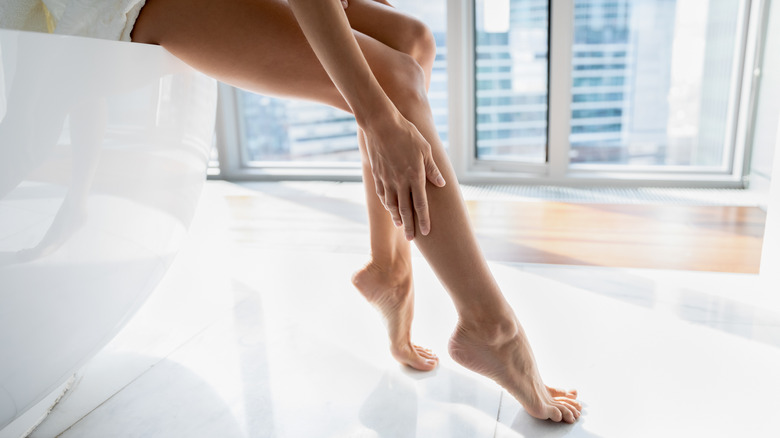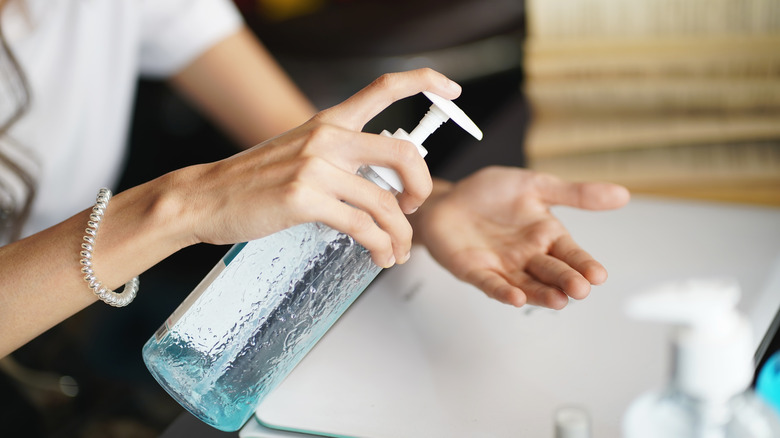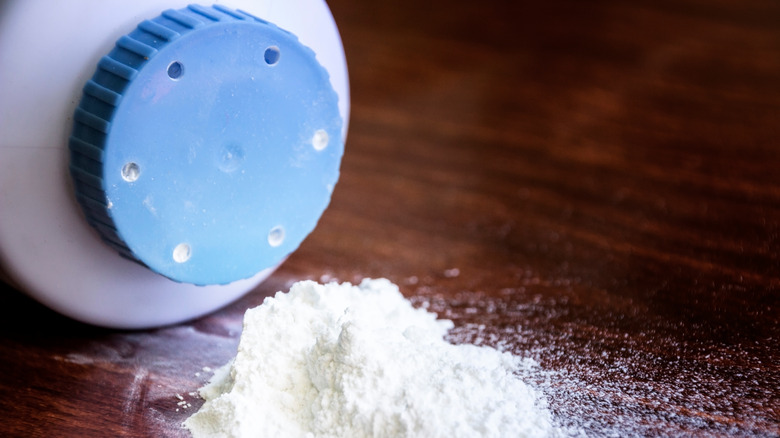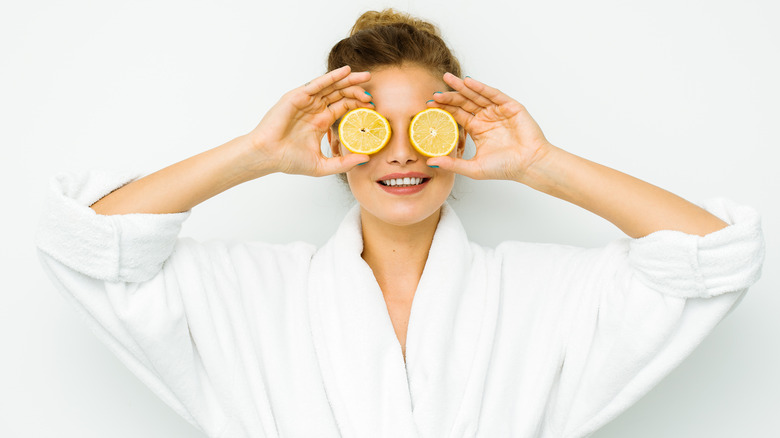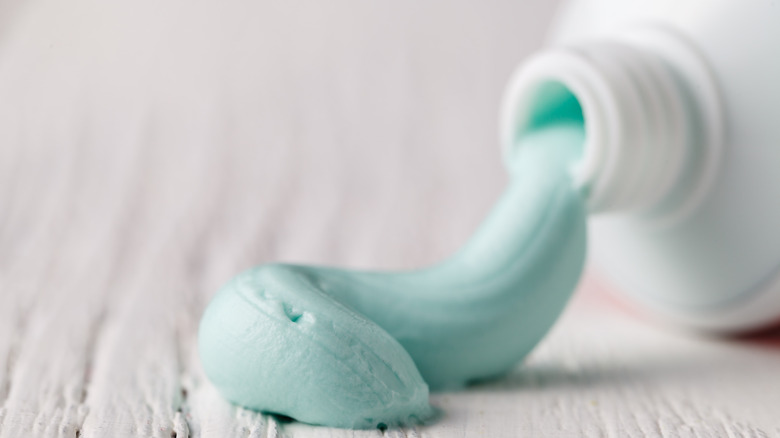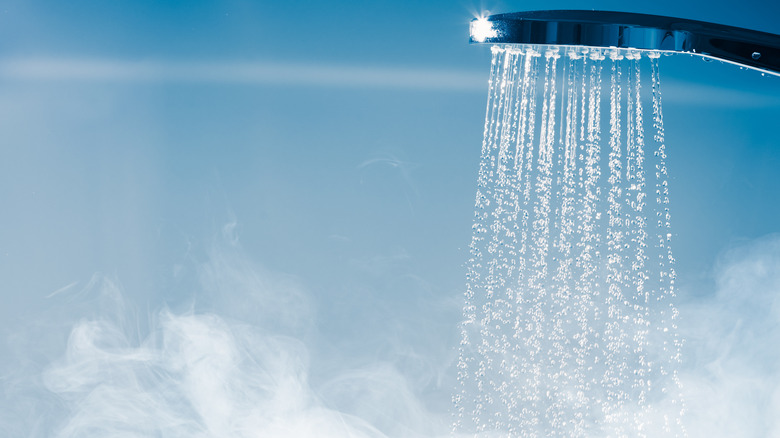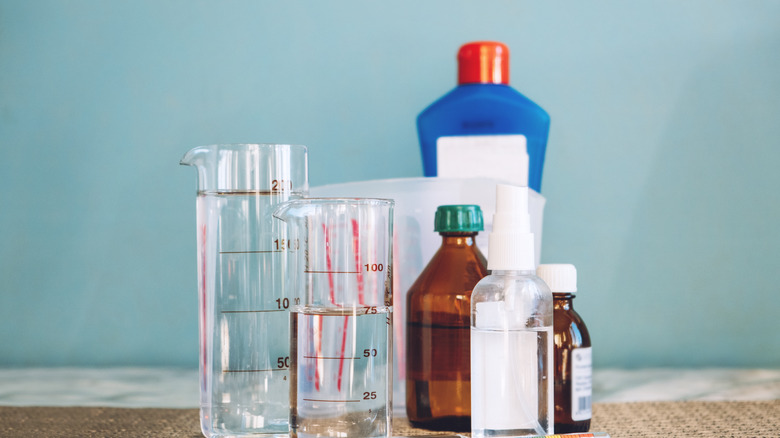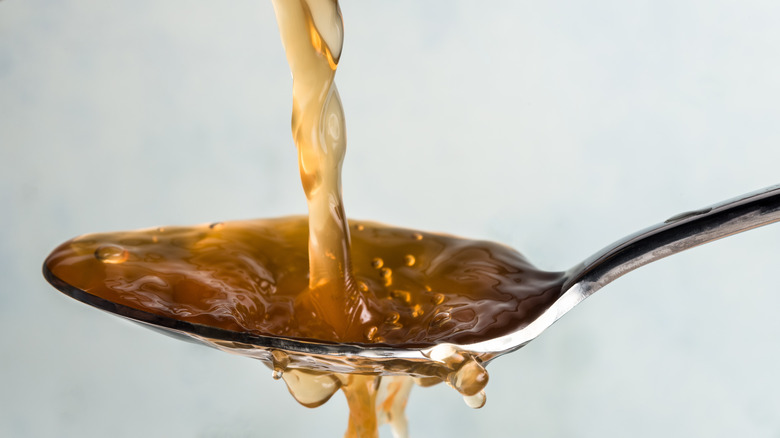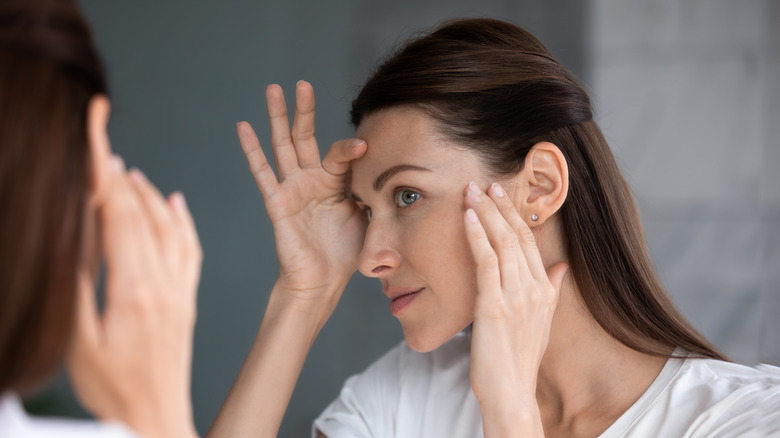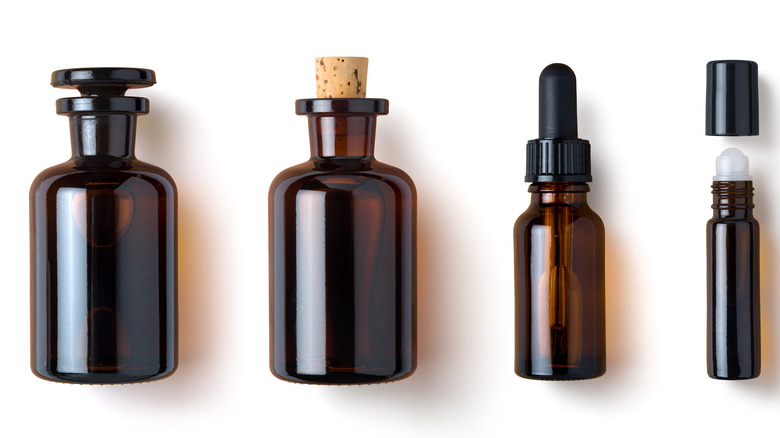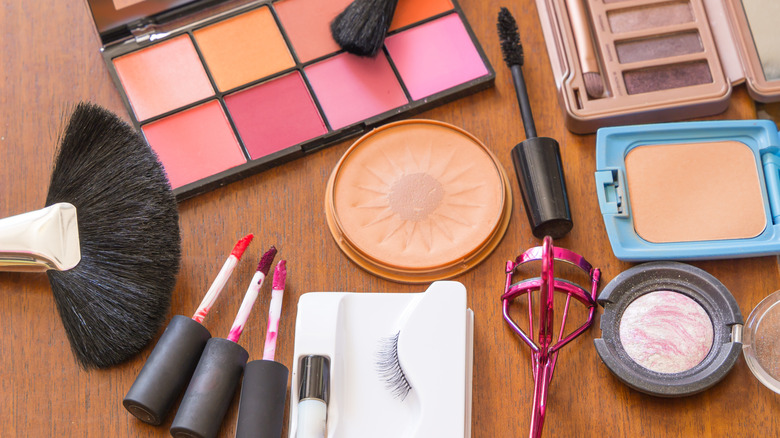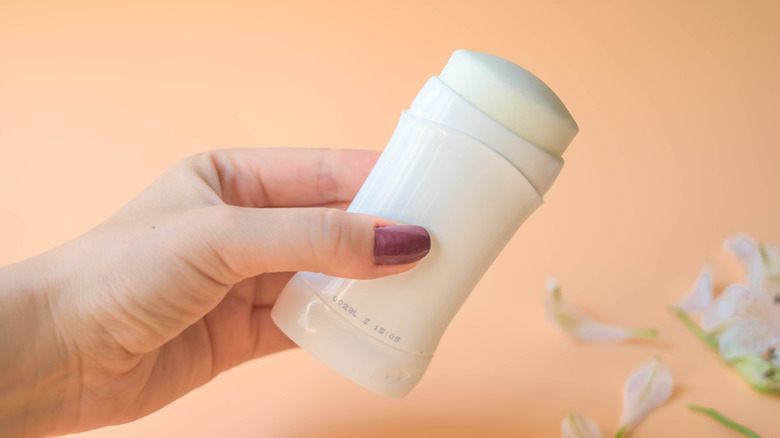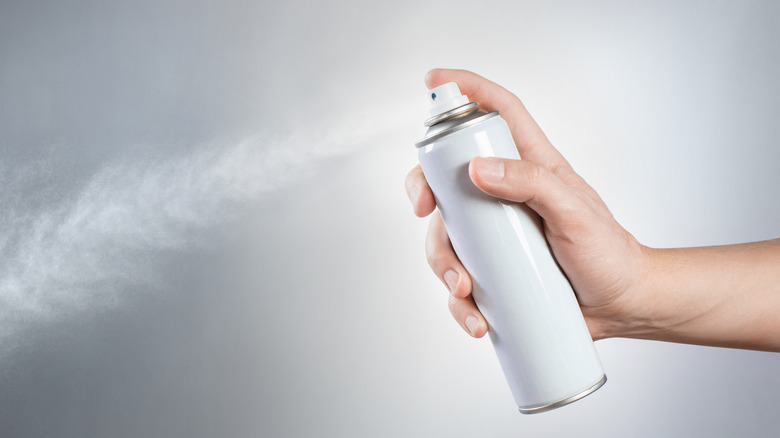Products You Should Absolutely Never Put On Your Skin
You eat well, you exercise regularly, and you prioritize your overall health and wellness — that's excellent. But, while you may treat yourself with mindful care, do you put as much thought and consideration into the products you actually use on your body? Maybe not. And it turns out, you could be using plenty of not-so-great things on your vulnerable and sensitive skin.
Let's be clear: Dermal absorption means that some chemicals you apply topically do, indeed, get into your body, bloodstream, and system (via World Health Organization). As such, you should probably be at least a bit more particular with the lotions, potions, and skin care ingredients you choose on the daily.
As noted by WebMD, your skin is your largest organ, so be good to it. Want to know where to start and what to try to avoid? Here are a few products to add to the skip-it list!
Antibacterial soap is not great for all-over use
You may gravitate toward antibacterial soap in the hopes it will eradicate germs and ward off pathogens and viruses. But the truth is there is no real evidence that these products — usually featuring dubious chemicals — are more effective than traditional soap and water. In fact, the U.S. Food & Drug Administration advised forgoing antibacterial soap altogether: "You can skip it, use plain soap and water."
Additionally, the active ingredients may do more harm than good. For this reason, regular soap is recommended. But even that may not even be necessary. As explained by Healthline, even conventional soaps can mess with your skin's natural pH balance, disrupt the sensitive barrier, and cause dryness and irritation. The reality is: You can mostly skip the soap in favor of water. Yes, water alone works to wash away dirt — but you can also try oil cleansing, dry brushing, or make your own natural soap using nourishing ingredients like coconut oil (via Healthline).
Baby powder comes with risks to your health
If you apply a talcum-based baby powder to your skin or genital area, you might want to stop sooner than later and find an alternative option. While the evidence is murky, there is a strong belief in the medical community that women who use talc baby powder on or close to their genitals are at an increased risk of getting ovarian cancer. Furthermore, it has also been asserted that some talc powders may even contain some level of asbestos, a chemical that is carcinogenic (via Healthline).
Finally, per Consumer Safety, repeated inhalation of talc powder might be linked to lung-related diseases, including lung cancer. Suffice to say, the dangers of talc are significantly greater than the benefits. So what can you use instead of traditional talcum powder? Try applying cornstarch or baking soda to your skin to prevent rubbing, as advised by DrugWatch. These options are considered safe and effective.
Lemon or other straight citrus is too strong
Certainly, many beauty and skin care products boast all sorts of citrus ingredients — and vitamin C has been shown to be an effective anti-aging treatment. While you could find plenty of homemade citrus recipes for scrubs and masks online, you are better off letting the professional chemists do their thing when it comes to this particular ingredient, as you may experience any number of negative reactions as noted by Healthline – the most common of which is skin irritation.
Citric fruits are extremely acidic, meaning lemon wedges and lime juice can cause your skin to redden and peel. What's more, applying lemon directly to your skin can increase your risk of getting a sunburn — adding acidic insult to injury. "Due to its potency and potential side effects, lemon ought to be used as a spot treatment only," Healthline confirmed. And if you do decide to spot-treat, at least do a patch test first, and give it 24 hours to make sure you do not develop any negative reaction.
Toothpaste cleans your teeth – not your skin
Has someone (or the internet) ever advised you to put a little toothpaste on a blemish? You may be tempted to try anything and everything when an unsightly pimple pops up in a very visible spot, but this product is meant for your mouth — not your face or body.
As explained by Healthline, "While the strength of the chemicals in your toothpaste might be safe on your pearly whites, they could be too strong for your skin." Dermatologist Dr. Tsippora Shainhouse told the medical site that toothpaste has a basic pH which can alter and harm the skin's natural acidity levels. Additionally, common toothpaste ingredients such as sodium lauryl sulfate, triclosan, alcohol, or hydrogen peroxide can cause further dryness, redness, and irritation.
So next time you find yourself with a zit, apply some acne treatment and save the toothpaste for your teeth. (Hey, friends will be so distracted by your gorgeous grin, they won't even notice your pimple!)
Hot water feels good, but it does damage
Nothing feels as relaxing as stepping inside a steamy hot shower. It is a simple way to let the day's stress melt away. However, this soothing self-care ritual of yours is actually not a good way of caring for yourself after all.
The harsh reality is that hot water can dry out your skin and disrupt its delicate protective barrier. This is even more pronounced if you have conditions like eczema or psoriasis, as noted by Allure. And while you may be tempted to turn the water thermostat up in the winter months, this will just compound the problem.
"We are all more prone to itchy, dry skin as the humidity levels drop and the hot water in showers ... draws moisture out of the skin," dermatologist Shari Marchbein told the magazine. She elaborated that for the sake of your skin, keep those showers lukewarm.
Alcohol, witch hazel, or hydrogen peroxide can do more harm than good
The truth is you can't completely avoid alcohol in your skin care routine. It's a common ingredient, and it's usually harmless. However, you want to be aware of how strong it is, and what its purpose is in your toner, moisturizer, or cleanser.
Dermatologist Lauren Fine explained to Everyday Health that those who have sensitive skin, visible irritation, or a compromised barrier may want to avoid the potent ingredient. Moreover, scan the ingredients in a product. If some form of alcohol is listed early on, it's probably highly concentrated. If it's toward the bottom of a list, it most likely won't hurt your skin, as noted by dermatologist Gretchen Frieling.
Similarly, there's a time and a place (and specific purpose!) for witch hazel. Basically, you want to use sparingly as it "can cause skin issues but only if used too frequently. You should only be using witch hazel a few times a week to avoid over-drying or stripping away the skin's natural protective barrier," Nicole Hatfield, certified esthetician, told PureWow. You'll also want to take heed when using hydrogen peroxide for issues like acne and wounds. "If you were to use a higher concentration of hydrogen peroxide on your skin, burning and blistering could occur. Even low concentrations, like 3% medical-grade options, can cause skin irritation," as noted by VeryWell Health.
Raw eggs are risky
You may have heard of DIY egg white facials or body treatments, but you will want to reserve eggs for baking purposes. It is never a wise idea to put something that could potentially harbor salmonella on your face. What's more, if you have an allergy to eggs, it can also affect you when applied topically. Even if you do not have a known sensitivity, egg whites can also irritate your skin and cause an unsightly reaction.
If you decide you must use them, however, Healthline suggests opting for "the safest eggs possible," meaning those that are "organic, pasteurized eggs or [from] egg white cartons." You may notice a temporary softening of the skin after use, but this is fleeting and won't benefit your regimen in the long term. You are better off trying treatments that actually will have a more significant impact. Try coconut oil for moisture, green tea extract for inflammation reduction, and vitamin C products for instant brightening (via Healthline).
Straight apple cider vinegar can burn your skin
Many people love to include apple cider vinegar in their daily regimens — whether taking it orally or using it topically. But one thing you never, ever want to do is drink or apply straight ACV right from the bottle. This popular potent ingredient should always be diluted in water first.
Some people swear it helps their eczema, dandruff, or acne, but even diluted it can be too strong and potentially irritate your skin. And it's important to note that its positive effects are more anecdotal, less evidence-based. Dermatologist Raechele Cochran Gathers told Real Simple, "While it may be helpful for some people's skin issues, it's important to know there haven't been any good studies to support the claims people make about using ACV as a skin treatment." She elaborated on the potential risks, too: "Always check with your dermatologist first. ACV is acidic, and there are reported cases of people having severe skin irritation and even burns on the skin using it." And if you decide to give it a try, do not forget to do a patch test first.
Strong at-home chemical peels are dangerous
It's a good news, bad news situation. The rise of e-commerce sites has made it super easy to get at-home treatments you once would have to travel to the spa or dermatologist for. On the flip side, the regulation on some products is lax, making it easy for you to get your hands on a chemical peel you have no business using on yourself at home.
So how do you know which DIY peels are a go, and which are a no? Read the ingredients label, as suggested by dermatologist Ava Shamban in Elle. "If you choose incorrectly you may not turn into a reptile, but your skin could certainly peel like a snake shedding its skin."
Moreover, rather than try an aggressive option from the get-go, she suggests pacing yourself: "My advice is to start with the lowest strength peel and work your way up." And if you have sensitive skin, be wary of glycolic peels. "It can cause chemical burns if it's too strong," Shamban revealed.
Some essential oils should be kept in the diffuser
You may enjoy diffusing essential oils for a relaxing and invigorating scent or to set an ambient mood. Some, anecdotally, even swear by their healing and medicinal properties. But overusing them or using them incorrectly — like liberally applying them to your skin — can do more harm than good.
Joie Power, a neuropsychologist and aromatherapist, told WebMD, "Essential oils, properly used, are safe and effective for many routine issues." However, she elaborated that she continues "to hear of bad, even dangerous, reactions from people who are grossly misusing them. People are being hurt by following some of the inappropriate advice that's being given out there."
In short, you will want to do your due diligence before you decide to use, diffuse, swallow, or topically apply essential oils. Your skin in particular could be extra sensitive to options containing furocoumarins (found frequently in citrus oils). This ingredient commonly leads to chemical burns as a reaction to sun exposure (via WebMD).
Expired makeup and skin products need to go
You may have a favorite mascara that is no longer made, a body lotion that has been taken off the shelves, or a long-forgotten foundation that has been perched on your shelves for years, but hear us out: Those expired products belong in the trash — not on your skin.
First of all, the texture and consistency of these products will change over time, and not for the better. Then there's the fact that the active ingredients will become less, well, active (which is exactly why using expired sunscreen is a no-no). Worst of all though is that the molecular makeup of your favorite products change.
Dermatologist Hadley King told Women's Health that "all of the molecules in these products can break down into something else, and you can have a reaction to it." Think: inflammation, irritation, or worse. What's more, old lipsticks and mascara wands and other contact-heavy products can harbor bacteria which can lead to infection. So, yeah, it's time to toss that crusty eyeliner and get a new one!
Deodorant or antiperspirant is for pits only
So you want to stave off sweat and shine on your face — or maybe prevent pesky cleavage perspiration? While some people might be inspired to try applying deodorant or antiperspirant to body parts besides their underarms (apparently this is a trendy "hack"), this is probably not the best beauty and skin care option.
First, be aware that deodorant just masks odor, while antiperspirant stops sweat altogether — so you could just be rubbing fragrance on your face (and what good is that?). Additionally, there are all sorts of ingredients you are exposing your sensitive skin to. Dermatologist Christine Choi Kim told Seventeen that "using either an antiperspirant or deodorant on your face could lead to irritation, allergic reactions, and possibly breakouts."
And if you do decide to give this questionable practice a try? At least opt for a natural deodorant that is aluminum-free, as suggested by PopSugar. Or, you know, keep the roll-on reserved for your stinky pits, and opt for other mattifying products instead.
Hairspray is for your hair
All sprays are not created equal. And while hairspray might shellac your hair in place for the day, it has very different active ingredients than those in a makeup setting spray — or anything you would purposely apply to your body, for that matter.
Glo Skin Beauty skin care expert Amanda Von Dem Hagen explained to Glamour why you should never purposely get it on your exposed skin: "Hairspray has repellants in it that could irritate your skin, leaving it itchy, red and bumpy." Furthermore, it has harsh and drying ingredients like "alcohol and lacquers" which can make the skin "become dehydrated and look much older." And the final reason to skip it? It will likely leave your skin feeling tight and uncomfortable. Yes, next time you want to make sure your makeup is flawless try a setting powder or a water-based spray, as recommended by Glamour.

